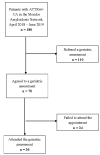Frailty in Wild-Type Transthyretin Cardiac Amyloidosis: The Tip of the Iceberg
- PMID: 34362197
- PMCID: PMC8348590
- DOI: 10.3390/jcm10153415
Frailty in Wild-Type Transthyretin Cardiac Amyloidosis: The Tip of the Iceberg
Abstract
ATTRwt-CA occurs in elderly patients and leads to severe heart failure. The disease mechanism involves cardiac and extracardiac infiltration by amyloid fibrils. The objectives of this study are to describe the frailty phenotype in patients with ATTRwt-CA and to assess the associations between frailty parameters, the severity of cardiac involvement, and the course of amyloid disease. We used multidimensional geriatric tools to prospectively assess frailty in patients with ATTRwt-CA consulting (in 2018-2019) in the French National Reference Center for Cardiac Amyloidosis. We included 36 patients (35 males; median age: 82 years (76-86). A third of the patients were categorized as NYHA class III or IV, and 39% had an LVEF below 45%. The median serum NTproBNP was 3188 (1341-8883) pg/mL. The median duration of amyloidosis was 146 months (73-216). The frequency of frailty was 50% and 33% according to the physical frailty phenotype and the Short Emergency Geriatric Assessment questionnaire, respectively. Frailty affected a large number of domains, namely autonomy (69%), balance (58%), muscle weakness (74%), malnutrition (39%), dysexecutive syndrome (72%), and depression (49%). The severity of CA was significantly associated with many frailty parameters independently of age. Balance disorders and poor mobility were also significantly associated with a longer course of amyloid disease. Frailty is frequent in patients with ATTRwt-CA. Some frailty parameters were significantly associated with a longer course of amyloid disease and CA severity. Taking into account frailty in the assessment and management of ATTRwt should improve patients' quality of life.
Keywords: cardiac amyloidosis; elderly; frailty; geriatric assessment; heart failure; wild-type TTR amyloidosis (ATTRwt).
Conflict of interest statement
AB has received consultant fees from NOVARTIS and VIFOR. TD has received consultant fees and research support from NOVARTIS, VIFOR, PFIZER, Alnylam, Akcea, and Resmed. The other authors declare that they have no conflicts of interest concerning this article.
Figures


References
-
- Maurer M.S., Bokhari S., Damy T., Dorbala S., Drachman B.M., Fontana M., Grogan M., Kristen A.V., Lousada I., Nativi-Nicolau J., et al. Expert Consensus Recommendations for the Suspicion and Diagnosis of Transthyretin Cardiac Amyloidosis. Circ. Heart Fail. 2019;12:e006075. doi: 10.1161/CIRCHEARTFAILURE.119.006075. - DOI - PMC - PubMed
-
- Dang J., Abulizi M., Moktefi A., El Karoui K., Deux J.-F., Bodez D., Le Bras F., Belhadj K., Remy P., Issaurat P., et al. Renal Infarction and Its Consequences for Renal Function in Patients with Cardiac Amyloidosis. Mayo Clin. Proc. 2019;94:961–975. doi: 10.1016/j.mayocp.2019.02.012. - DOI - PubMed
-
- Damy T., Kristen A.V., Suhr O.B., Maurer M.S., Planté-Bordeneuve V., Yu C.-R., Ong M.-L., Coelho T., Rapezzi C., THAOS Investigators Transthyretin cardiac amyloidosis in continental Western Europe: An insight through the Transthyretin Amyloidosis Outcomes Survey (THAOS) Eur. Heart J. 2019 doi: 10.1093/eurheartj/ehz173. - DOI - PMC - PubMed
-
- Rapezzi C., Merlini G., Quarta C.C., Riva L., Longhi S., Leone O., Salvi F., Ciliberti P., Pastorelli F., Biagini E., et al. Systemic cardiac amyloidoses: Disease profiles and clinical courses of the 3 main types. Circulation. 2009;120:1203–1212. doi: 10.1161/CIRCULATIONAHA.108.843334. - DOI - PubMed
LinkOut - more resources
Full Text Sources
Research Materials
Miscellaneous

